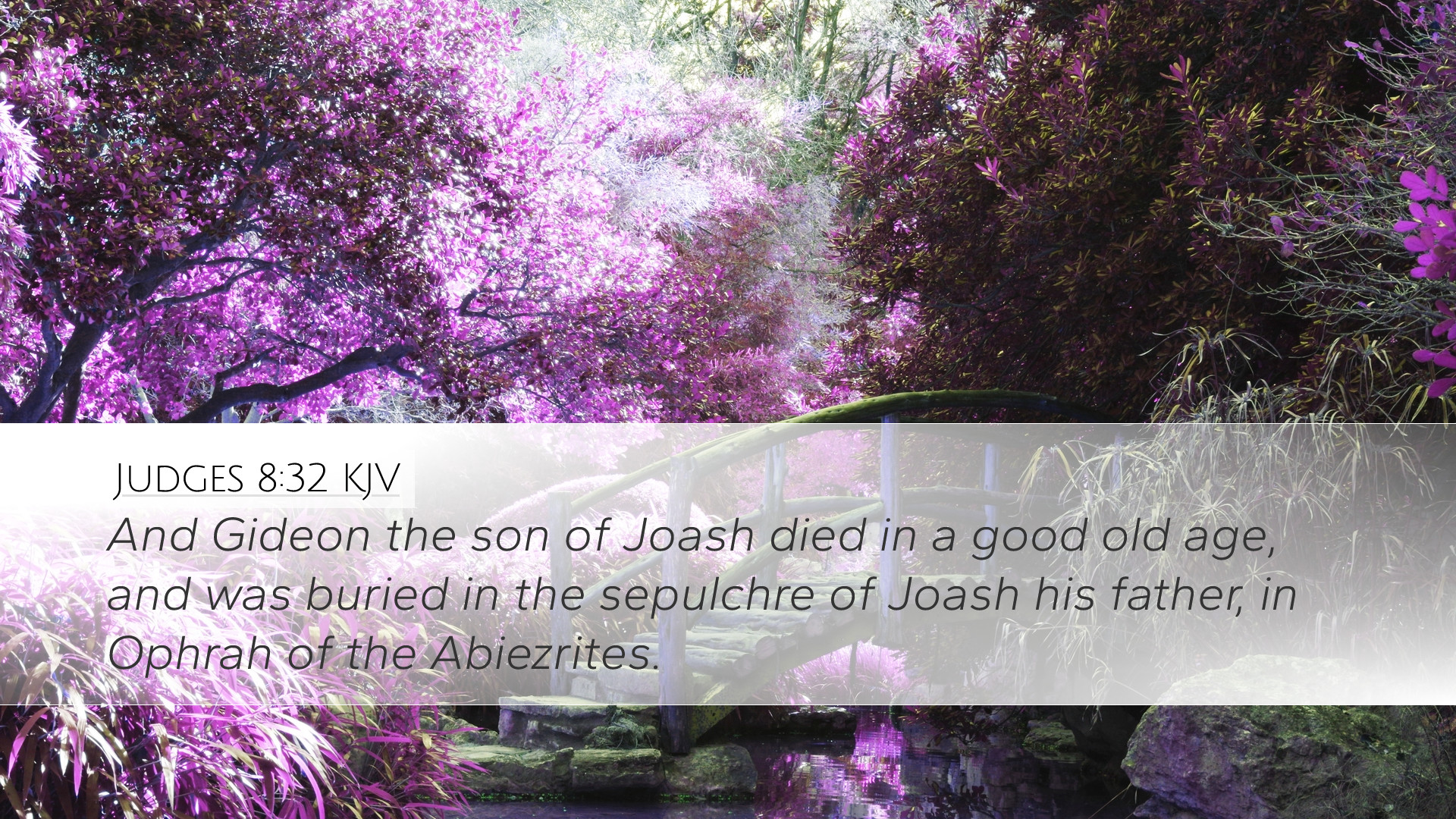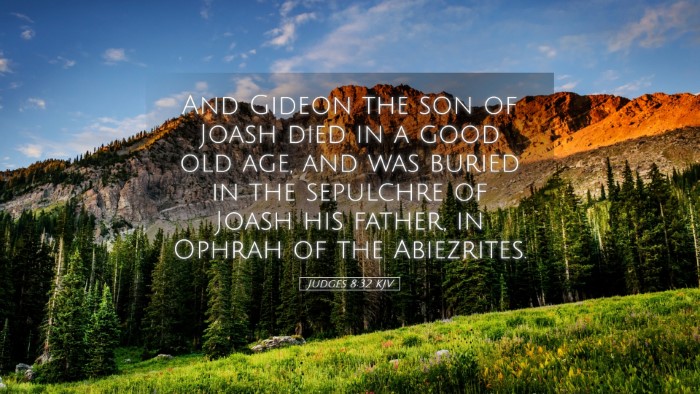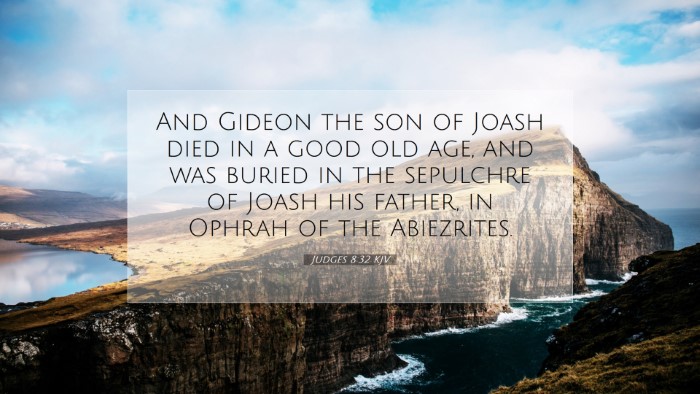Commentary on Judges 8:32
Verse Text: "And Gideon the son of Joash died in a good old age, and was buried in the sepulchre of Joash his father, in Ophrah of the Abiezrites."
Introduction
This verse serves as a significant conclusion to the life of Gideon, a judge who led Israel during a time of oppression. His death marks the end of a notable period characterized by divine intervention and national deliverance. Public domain commentaries provide powerful insights into the meaning and implications of Gideon’s life, his legacy, and the theological implications of his death.
1. Contextual Significance
Before analyzing verse 32, it is crucial to understand the broader context of the Book of Judges. The era is marked by a cycle of sin, oppression, repentance, and deliverance. Gideon emerges as a figure of faith who delivered Israel from Midianite oppression but also illustrates the complexity of human leadership and the dangers of idolatry.
1.1 The Life of Gideon
Gideon’s journey begins with his call by God at a time when Israel was in dire straits. He displayed incredible faith, instigating a military campaign against overwhelming odds. His narrative reflects the tension between divine command and personal hesitation, showcasing the multifaceted nature of leadership in a theocratic context.
1.2 The Legacy of Faith
Judges 8:32 serves to encapsulate Gideon’s legacy. The term "good old age" reflects not just physical longevity but signifies a life well-lived in service to God and His people. The commentaries by Matthew Henry and Albert Barnes emphasize that a life dedicated to God, despite flaws, leaves a lasting impact worthy of commendation.
2. Theological Implications
Gideon's death and burial highlights several theological themes prevalent throughout scripture.
2.1 Divine Sovereignty
The burial of Gideon in the sepulchre of Joash his father symbolizes God’s faithfulness in preserving His people. It reminds believers of God’s sovereignty over life and death, echoing the message that true deliverance is rooted in divine appointment and not merely in human effort.
2.2 The Nature of Rest
After his death, Gideon enters into rest, a concept that resonates deeply within Christian theology. Adams Clarke notes that this rest is a “divine peace” that believers can expect after a righteous life. The use of "good old age" further emphasizes that rest in God follows a life that has fought successfully against the challenges faced.
2.3 Human Leadership and Legacy
Commentaries also discuss the duality of human leadership. While Gideon was a judge empowered by God, his later life choices, particularly the creation of the ephod, serve as a cautionary tale against idolatry. Albert Barnes highlights that, even great leaders can falter, and thus emphasizes the importance of remaining steadfast in faith and rejecting the allure of idolatrous practices.
3. Exegetical Reflections
Examining the Hebrew text provides additional layers of meaning. The description of Gideon’s death and burial has implications for understanding Hebrew notions of honor and ancestral connections.
3.1 Honor in Death
In ancient Hebrew culture, burial places held significant meaning. Being interred in his father's sepulchre signifies continuity, familial honor, and the passing of leadership. Matthew Henry notes that such an honor also reflects Gideon’s lasting influence on the societal memory of Israel.
3.2 The Place of Ophrah
The mention of Ophrah ties Gideon's legacy directly to his geographical and cultural roots. It reinforces the importance of understanding one's heritage when examining the impacts of leadership on a community. Alfred Clarke emphasizes that leaders must remember their origins while guiding their people toward righteousness.
4. Practical Applications
This commentary is not merely a historical or theological exercise but serves to inform present-day ministry and personal faith journeys.
4.1 Learning from Ourselves
Pastors and leaders are encouraged to reflect on their lives in light of Gideon’s story. The importance of a faithful legacy should inspire leaders to invest in their spiritual growth and that of their community, recognizing the eternal impact of their leadership.
4.2 Embracing Rest
Understanding the concept of 'rest' can comfort believers facing fatigue in service. Just as Gideon experienced divine rest after his labors, modern Christians can find assurance in their faith journey, knowing that God rewards faithfulness.
Conclusion
Judges 8:32 encapsulates the culmination of Gideon's life and leadership—a complex legacy of faithfulness intertwined with human frailty. Insights drawn from public domain commentaries provide a well-rounded understanding of the spiritual, cultural, and theological dimensions of this verse. The challenges and triumphs of Gideon’s life present timeless lessons for today's pastors, theologians, and students of the Bible as they navigate their own journeys of faith and leadership.


